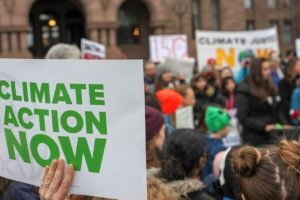Earth Day, Every Day
We have historically been very busy leading up to Earth Day. For obvious reasons, this year is different.
“Every day is Earth Day at Collective Resource Compost!” is a joke I often make at this time of year. Imagine it being said in a really perky voice. We have historically been very busy leading up to April and Earth Day both with requests to speak and requests to help facilitate zero waste events. For obvious reasons, this year is different. Everything has been canceled or postponed.
Earth Day is having a big birthday: 50 years old on Wednesday, April 22nd. I was looking on earthday.org and there is a map that shows where on Earth all of the Earth Day events are planned. It was hard to look at the map without imagining that the dots represented COVID-19 outbreaks. These are trying times, aren’t they?
I learned the history of Earth Day from that website:
Earth Day was a unified response to an environmentin crisis — oil spills, smog, rivers so polluted they literally caught fire.
On April 22, 1970, 20 million Americans —10% of the U.S. population at the time — took to the streets, college campusesand hundreds of cities to protest environmental ignorance and demand a new wayforward for our planet.
The first Earth Day is credited withlaunching the modern environmental movement, and is now recognized as theplanet’s largest civic event.
Every Earth Day has had a theme and this year’s is Climate Action.

This year’s theme got me thinking about if there is climate action we can take even when so many of us are holed up in our homes trying not to spread or catch this virus. Can we still act without gathering? Can we still live our values under these unusual and stressful circumstances?
Wasting food seems almost criminal during this crisis. Maybe now you have the time to read our blogpost Buy Less, Waste Less. It might be too late to buy less, particularly if you panic-shopped and filled your freezer and fridge. Not wasting the food you’ve bought is a climate action you can take without leaving your home.
Many of the restaurants in our composting community are open for carryout or curbside pickup. If you are able to do so, please support them by ordering meals or if you are self-quarantining, you can help them by buying gift cards online for meals in the future.
It is in my nature to look for silver linings, especially when there is so much bad news. Are you noticing that everyone is getting more creative in this crisis and looking for ways to do things differently? I’m observing this in myself and in others in all sorts of situations. I just read that a distillery in Chicago is planning to manufacture hand sanitizer designated for health care workers and retirement homes, not the usual gin and whiskey.
People are looking into their pantries and getting creative there too. Our composting customer Pam Gross of The Bread & Buddha Kitchen posted a recipe on Instagram for a sugar scrub to revive your hands from all of the handwashing and use that hard lump of white or brown sugar that is hiding in your pantry. I’ve got one of those, and I bet you do too. (1 cup sugar, 2 tablespoons coconut oil softened 15 seconds in the microwave. Add essential oil or fresh citrus. Mix together. Use olive oil instead, if needed. Wash. Scrub. Repeat.) They made the choice to close their business during this time. I hope that you will check them out when they reopen.

One of the creative solutions that is being employed by what feels like everyone everywhere is the zoom app. It enables you to gather virtually. Our composting customer Unitarian Church of Evanston (UCE) is planning on using it for their Earth Day celebration. Perhaps many of the Earth Day events on the map I mentioned earlier can still happen but in a different way.
The biggest silver lining is that some of the consumptive behaviors that we have had to put on hold are illustrating that our business-as-usual has a negative impact on the planet. The improved air quality in China and the clean canals in Venice, Italy are two good examples. I will be curious to see how this plays out in American cities.

The question I leave you with is: Will we go back to exactly how we were doing things or could our climate action for Earth Day be to not do that?